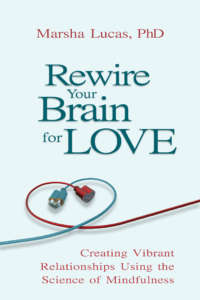 Some of us love to celebrate Valentine’s Day. Others haven’t been lucky in love and grow to loathe it. A friend of mine once threw an “I Hate Valentine’s Day” party after her boyfriend broke up with her. Ironically, she would meet her future husband that night!
Some of us love to celebrate Valentine’s Day. Others haven’t been lucky in love and grow to loathe it. A friend of mine once threw an “I Hate Valentine’s Day” party after her boyfriend broke up with her. Ironically, she would meet her future husband that night!
What makes one person attract romantic partners with the right characteristics to create a happy partnership and another get hurt over and over in the search for love?
“The way your brain is wired can either help you have happy, satisfying relationships or it can be a huge obstacle to healthy love,” says neuropsychologist and psychotherapist Marsha Lucas. In her wise and funny book Rewire Your Brain for Love: Creating Vibrant Relationships Using the Science of Mindfulness (Hay House), she explains that your wiring is a result of your attachment style, put in place before you were two years old. Yes, your early relationship with your parents has important implications for your romantic life later on. Through lively case studies and accessible neuroscientific explanations, she brings us to an understanding of what might be holding us back in our quest for love and what we can do about it.

Only 55% of adults in this country have a secure attachment style, meaning that their parents imbued them with a sense of safety, security, and well-being. This actually affects how your brain takes shape. The other 45% have an insecure attachment style. They’re ambivalent or anxious about closeness, maybe even avoiding it altogether, because of what they picked up from their parents as young children.
The neural networks that handle attachment dictate how we respond. For those who are insecurely attached, old and deeply wired memories of what is or isn’t safe will rear up throughout life. They might think they’re reacting to what’s happening in the moment, but they’re actually reacting to a primitive part of their brain kicking in. They might crave relationships but be unable to trust them. They might be convinced they “don’t need anyone.” To someone who had neglectful parents, any romantic attention might be overblown and misunderstood. Someone whose parents showed little affection might fall in love with someone who can’t even tell that he loves her. And just plain fear may keep us in bad relationships.
The good news is that your brain can change, even with regard to whom and how you love. You can acquire powerful skills to rewire your brain if it’s less than ideal when it comes to love. In this book you’ll learn how to
1. Manage your body’s reactions
2. Regulate your response to fear
3. Become emotionally resilient
4. Become flexible in your responses
5. Develop insight into yourself
6. Develop empathy and attunement within yourself and with others
7. Shift your perspective from “me” to “we.”
One of the most powerful tools in achieving these goals is mindful meditation. Just a few minutes a day can send signals to your sympathetic and parasympathetic nervous system. In love, we often focus on possible future pain or hurt. Learning to focus instead on right now—to train yourself to check in with yourself—can make an enormous difference in finding love. Each chapter ends with a different meditation to help you get there.
The chapter on fear is the strongest. “It all comes down to fear, fear of fear, fear of conflict, fear of being alone, fear of getting too close, fear of failure…,” Lucas writes, and mindfulness helps you know when your fear response is revving up so you can calm it down. Breathe slowly and deeply, imagine increased warmth to your hands, relax your tongue, and open your mouth slightly. I wouldn’t suggest doing this during dinner on a first date, but recognizing and modulating your own fear response, among other tips, may bring love surprisingly closer.
As Lucas explains, “All of us carry around self-limiting thoughts as a way of protecting ourselves from change.” It’s important to understand that “your thoughts are not who you are. Your thoughts are basically momentary neurological events that shape your brain. Provoke different thoughts—different neurological events—and you provoke a different ‘you.’”
That might not sound like the most romantic way to fall head over heels, but if you’re among the 45% whose parents left you with an insecure attachment style, Cupid might never find you unless you take a detour into mindful meditation first.
Click here to see Rose’s tips for healthy and happy relationships

3 Comments
Pamela
Excellent review. Looks like a helpful book!
Natalie
I think for a lot of people love is fear because of past relationships. If we could learn how to rewire the brain, that would give us more of a chance at love. Yes, this books sounds like a great read.
aaron
Learn more from the top neuroscience experts at http://len.life/shop/mind/best-of-neuroscience-series/